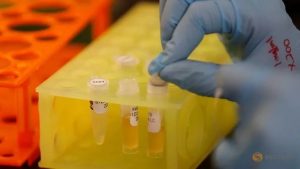
FILE PHOTO: A Lab technician works at Sorrento Therapeutics where efforts are underway to develop an antibody, STI-1499, to help in prevention of COVID-19 in San Diego, California, US, May 22, 2020.
INDIANAPOLIS: Eli Lilly and Co said on Monday (Aug 3) it started a late-stage trial testing whether one of its experimental COVID-19 antibody treatments can prevent the spread of infections in residents and staff at US nursing homes.
The Indianapolis-based drugmaker said it dosed the first participant in the placebo-controlled trial at a nursing home in Illinois.
LY-CoV555, which is being developed in partnership with Canadian biotech AbCellera, is already being studied as a treatment in patients who have contracted the disease. The nursing home trial will test whether it works prophylactically.
The Phase III trial is expected to enroll up to 2,400 participants who live or work at facilities that have had a recently diagnosed case of COVID-19.
Lilly is also developing other potential antibody treatments for COVID-19, but has prioritized manufacturing LY-CoV555, Chief Scientific Officer Daniel Skovronsky said. The company hopes to have over 100,000 doses available by year-end, he said.
“If it works, that’s not enough. Doses will have to be prioritized to patients that need it the most,” Skovronsky said in an interview, noting that preventing spread in nursing homes is one scenario that would likely be prioritized.
The elderly are at particularly high risk for the disease that has claimed more than 690,000 lives globally.
If the drug proves effective, Skovronsky said Lilly hopes to manufacture around a million doses by the end of 2021.
The nursing homes trial is being conducted in partnership with several long-term care networks across the country, as well as the US National Institute of Allergy and Infectious Diseases.
To speed the study, the company has created mobile research units including retrofitted recreational vehicles that can be deployed in response to coronavirus outbreaks at nursing homes across the United States.
LY-CoV555 belongs to a class of drugs known as monoclonal antibodies, which are among the most widely used biotechnology medicines. Regeneron Pharmaceuticals Inc and other drugmakers are testing similar treatments against COVID-19.
Last week, Lilly told investors that LY-CoV555 had moved into mid-stage trials as a treatment and that late-stage trials would begin in the coming weeks.
Skovronsky said that the earliest data to be released would likely come from a Phase II study in patients with COVID-19 who have not been hospitalized.
Because that study is based on measuring patients’ viral load – the amount of virus detectable in the blood – rather than preventing hospitalizations or deaths, the data could be released a few weeks after enrollment for the trial closes, he said.
That data, however, might not be enough for the company to receive US emergency use authorization for the drug, Skovronsky said, noting that the company may still have to show it can reduce hospitalizations or other risks to assure regulators.
Eli Lilly shares were up around 1.6 per cent.

